
Engaging Hearts and Minds in a Broken Culture
This discussion offers a preview of Volume #16 “Cultures in Conflict” from the That The World May Know video series, available below.
Home » Episodes » Focus on the Family Broadcast » Finding Purpose In Your Empty Nest Years (Part 1 of 2)
Woman: “I miss their mess. I miss their noise. (laughs) I miss their rudeness and neediness. I miss their laughter. I miss my place in their lives. I mean, who am I? And what do I do with the rest of my life?”
John Fuller: Well, we all have struggles when the kids move out. That’s a quote from a book written by Jim Burns, and, uh, that really identifies what some of those feelings are. We’ve got Jim in the studio with us today on Focus on the Family, and we’re going to be unpacking this topic. Thanks for joining us. Your host is Focus president and author, Jim Daly, and I’m John Fuller.
Jim Daly: And John, I’ve got one that’s flown the coop, on that is perched and ready to do that, I’m just not sure when. (laughs) And then, uh, where are you at?
John: You’re a, you’re a near empty nester.
Jim: I’m a near empty nester. Where are you at in this journey?
John: Well, we are technically empty nesters. We have been for some time. When the last kid moved out, my mother-in-law moved in for a couple of years. And she’s in eternity now, so we are experiencing the fullness of an empty house and it’s really kind of nice.
Jim: It is. And, you know, we do ask folks where are they at? What do they want to hear? And this is one of the topics that comes up pretty regularly now, that, you know, “Do more for the grandparenting age and stage, and help us better understand how to, how to live this part of our life a little better.” So we’re going to talk about it today, what empty nest looks like, maybe in the grandparenting stage for some. And just where we need to go from here. Um, I’m thinking of a friend whose kids, adult kids, live mostly around the neighborhood. I think he had three or four, out of the six kids, right nearby. And then, all of a sudden, in about a two- to three-week period, boom, they all left.
John: Oh.
Jim: And it wasn’t organized or talked about. It just happened. And he talked to me about the trauma of that, like they didn’t expect it, didn’t anticipate it, it just happened.
John: Mm-hmm.
Jim: And it was a bit of a struggle for he and his wife to manage that and re-adapt, “What do we do now?”
John: Hmm.
Jim: So we’re going to get into all of this today with Jim Burns.
John: Yeah, and Jim has been here before, he’s always a popular guest. Our audience tells us, “We like Jim. We like what he says.”
Jim: (laughs)
John: He’s the president of Homeward, an organization that really advances the kingdom of God by educating and equipping parents to build God-honoring families. He and his wife, Cathy, have three girls. They’ve all left the nest, at least for now.
Jim: (laughs)
John: And, uh, he really captures a lot of his insights and experiences in terrific book called Finding Joy in the Empty Nest: Discover Purpose and Passion in the Next Phase of Life. We’ll encourage you to give us a call for your copy. 800, the letter A, and the word FAMILY, or stop by focusonthefamily.com/broadcast.
Jim: Jim, welcome back to Focus, good to have ya.
Dr. Jim Burns: It is so good to be with both of you-
Jim: (laughs)
Dr. Burns: … and, uh, I think I first came … I was talking with you, we were talking about young kids-
Jim: Yes, here we go.
Dr. Burns: … and now my kids have flown the coop. You all have these stories. And so now here we are talking about the empty nest.
Jim: Yeah, it’s fun. I mean, this is part of life, right?
Dr. Burns: It, it really is. And it’s a good part of life, but for a lot of people it’s a tough part of life, as you mentioned.
Jim: Well, it can be. That transition story I talked about, sometimes it’s kind of unplanned. You think the kids are going to be around. I know my brother and his wife, they’ve kinda … They’ve sold their house in California, moved to Oregon to be near the grandkids of their adult daughter, and they decided to move out to Tennessee. And so they thought, “Wow, okay. What do we do now?” Sold the house, got an RV, and they’re kinda touring around the country and spending more time in Tennessee so they can be near the grandkids. But, everybody’s got some kinda story in this space and stage of life. Let me ask you, with the empty nest territory, it can be daunting for some of our listeners and viewers. Uh, it can take you by surprise like we’ve talked about, or it can even be planned and then it’s still emotionally is really hard to manage. So what’s that first idea, that, “Okay, this is gonna be new.” Do you fill it with stuff to do or what do you do?
Dr. Burns: Well, I think a lot of us didn’t prepare for it and all of a sudden it just happened.
Jim: Right.
Dr. Burns: So our daughter, Heidi, we drop her off at Cal-Poly San Luis Obispo, it’s in central California. And we were so busy getting things ready, it didn’t dawn on us that we were gonna become empty nester- We honestly hadn’t thought much about it.
Jim: Yeah.
Dr. Burns: We get in the car, Cathy and I didn’t talk to each other for about a half an hour. We ju- I was in my thoughts, I’d look at her, she’s gazing out the window. And all of a sudden I see a tear running. I said, “You okay, babe?” She goes, “Yeah. No, I’m okay.” I said, “Do you want to stop in Santa Barbara?” It’s about 90 minutes.
Jim: Yes.
Dr. Burns: “Do you want to stop in Santa Barbara-
Jim: (laughs)
Dr. Burns: … and get a lunch?” Which she would typically say what you just said.”
Jim: Yeah.
Dr. Burns: And she said, “No, I’m okay. I, I’m not really hungry.”
Jim: Oh, wow.
Dr. Burns: “I’ll, I’ll just drive all the way home. And we get home, and it was quiet.
Jim: Hmm.
Dr. Burns: And do you know that the next day is when I wrote that phrase, “I miss their mess, I miss …” I even said, “I miss their rudeness,” right?
Jim: Yeah.
Dr. Burns: And I hadn’t really missed their rudeness yet. But what we found is that we had to reinvent ourselves. And I found in writing Finding Joy in the Empty Nest, that there were so many people that felt loss and grief. And I did all the focus groups during the pandemic, of all times, and so … On Zoom, some of your friends were on that. And I didn’t see it coming, I mean, I saw fun things, and they would talk, John, like to your situation. “Oh, yeah. I don’t have an empty nest, my mother-in-law’s back in.” And all the complications understood that. But what I didn’t hear was the depth of pain, what I now call the Empty Nest Syndrome. And, you know, Cathy experienced it because she was the sun and we had three planets going around her while, I, I’m a fourth planet. (laughs)
Jim: (laughs) yeah. And all of a sudden-
Dr. Burns: She’s the anchor.
Jim: Exactly.
Dr. Burns: She is in our home, and all of a sudden she didn’t have a place.
Jim: Ah.
Dr. Burns: So she experienced a sense of, you know, even anxiety and she’s not an anxious person necessarily, but some sadness. And I went, “Well, I don’t have it.” And then I found out later, wait, I was just going to work an hour earlier, staying an hour later. So my Empty Nest Syndrome, pain, was a different kind but I still experienced it. And I, I see a lot of people experiencing that, and the people who do well in the empty nest are the people who figure out how to live in a different stage. And the people who don’t do well, they’re stuck. And I think one of the big principles that I love is just simply this principle, when your child leaves home and their life fills up with fresh ideas, you do the same.
Jim: Mm. Yeah.
Dr. Burns: It’s a rite of passage.
Jim: Yeah, I was going to ask you this, and then I want to get back to the Empty Nest Syndrome point that you made. But in one of the articles I read a few years ago was The Graying of Divorce.
Dr. Burns: Yeah.
Jim: And it pointed to this substantial increase, the fastest growing segment of the culture-
Dr. Burns: Yeah.
Jim: … filing for divorce were empty nesters-
Dr. Burns: Yeah.
Jim: … you know? And mostly women. Uh, the wives and mothers because they go, “Wow, I feel like my job is done. I really don’t know you anymore. We don’t have much in common. I think we’re done with our marriage.” Speak to that issue, ’cause that really is the-
Dr. Burns: Yeah.
Jim: … dramatic outcome of what you’re talking about.
Dr. Burns: Right, and I think a lot of your listeners might be surprised at that, that the greatest demographic, the largest demographic of getting a divorce right now is 50 and over-
Jim: Yeah.
Dr. Burns: … what they call, “The graying of divorce.” And I think part of it was, they had a lot of issues in their marriage and they held out for the kids.
Jim: Yes.
Dr. Burns: And then they looked up and said, “Wow. I don’t want to work at it hard enough.” The interesting thing is that when, they do work at it. Even in a troubled marriage, if they will persevere for, say, five years, and they’ll kind of reboot their marriage, 78% say that their marriage is better off.
Jim: Yeah.
Dr. Burns: So it’s the people who, instead of giving up … And some people come into this empty nest … Boy, they’re limping and they’re bruised in their marriages. But, the fact is, is you can reinvent … You were in love. So, I mean, if you’ve lost that, or if you drift, you can come back.
Jim: Yeah.
Dr. Burns: You can make course corrections, and that’s the good news of this.
Jim: You know, it’s important, data is important, I like to look at data because it shows a direction. And I remember, I think it was a University of Chicago study that showed … I don’t know how they did this, but they created two research groups, both headed for divorce, but they had the one cohort commit to counseling and staying married for a period of time, versus the other that were headed for divorce. They came back to them some years later, three, four years later. And 80% of those who fought for their marriages were doing better and happy. So 80% of the marriages survived is the point.
Dr. Burns: Yeah.
Jim: In the other group, 80% of the people who had divorced were extremely unhappy and said it was a mistake. That kind of supports … Well, it does, it supports your point.
Dr. Burns: I-It’s exactly that case. And again, it’s hard-
Jim: Yeah.
Dr. Burns: … because you’ve got to lean into it, you got to rework, you know, we were talking … Before the program, we were talking about working out. And, you know, I do it once a year, no matter if I need it or not, right?
Jim: (laughs)
Dr. Burns: But it’s not easy, but when you do, you get better at it.
Jim: And you feel better.
Dr. Burns: Yeah. So when you lean into your marriage and you work on your marriage, it makes since.
Jim: Yeah. No, that’s good. Going back to Empty Nest Syndrome, you mentioned four things that were really helpful for you, and I think, others that you’ve encountered-
Dr. Burns: Yeah.
Jim: … to deal with the, the negativity of the Empty Nest Syndrome. What are they?
Dr. Burns: Well, one is that you actually close this chapter. Uh, I was thinking back to rites of passages when I was younger and I was speaking to a lot of kids and stuff. I’d always talk about the rite of passage, you know, 13’s the rite of passage. 16 you get your driver’s license, all of these things, how cool was that? But this is a rite of passage. And if you don’t close the chapter and really feel and embrace this new empty nest, you’re not going to do well. So the people who did well closed the chapter.
Jim: Yeah, describe those that don’t close that, what does that look like generally?
Dr. Burns: They’re still trying to be in control with their adult kids who are someplace else.
Jim: What does that look like?
Dr. Burns: What that looks like is they’re giving them unsolicited advice-
Jim: (laughs)
Dr. Burns: … which is pretty much taken as criticism because the kids are saying, you know, “You don’t trust me to be an adult.”
Jim: Yeah.
Dr. Burns: They’re still trying to manage things that they can’t manage anymore.
Jim: Yeah.
Dr. Burns: And so, to close the chapter, it says, “You take a deep breath and you say, ‘You know what? I’m going to give my kids that passport to adulthood. They’re not always acting like adults, I get it, and whatever. But I’m going to do that, I’m going to close that ch- … this, the chapter with my kids being in the home, and open up a new chapter.’” And in that there’s some pretty exciting things that can happen.
Jim: Yeah.
Dr. Burns: Exciting things if you’re married, exciting things if you’re single, exciting things in your faith.
Jim: Yeah.
Dr. Burns: But you got to close the chapter.
Jim: I wanna, I wanna press in on this a little bit because I think it’s so critical, and you know, I think Jean and I experienced this with our two boys-
Dr. Burns: Yeah.
Jim: … and, you know, we’re still in the process of that empty nest-
Dr. Burns: Yeah.
Jim: … uh, development. But, you know, letting go sounds really easy.
Dr. Burns: Yeah.
Jim: Just let go.
Dr. Burns: Yeah.
Jim: But it’s hard because, I think, especially at 19, 20, 21, they’re not going to make always the right decisions. They’re adulting, but they’re learning to do it.
Dr. Burns: Yeah.
Jim: And our instinct as parents is to-
Dr. Burns: Yeah.
Jim: … continue to control-
Dr. Burns: Yep.
Jim: … you know, “Did you get that doctor’s appointment done?” You know?
Dr. Burns: Right.
Jim: “What’s your oil light saying to you?” I, I’ve been guilty of that. I just asked Troy that the other day.
Dr. Burns: Yeah.
Jim: “Is it time for some maintenance on your car?”
Dr. Burns: Right.
Jim: And he said, “I think so, my right window’s not going up.”
Dr. Burns: (laughs)
Jim: I- … He probably, you know, will go ahead and make the appointment, right?
Dr. Burns: Yeah.
Jim: But, uh, those are kind of the indicators that maybe-
Dr. Burns: Yeah.
Jim: … you’re taking too much as the parent on.
Dr. Burns: No, we’re-
Jim: No, so just to speak to that, and that control feature-
Dr. Burns: Yeah, well, I think we’re controlling and sometimes when we control, we enable. And we always mean well. I mean, when you ask, you know, the oil light. My goodness, that’s a great question. Sometimes experience is a better teacher than advice.
Jim: (laughs)
Dr. Burns: And so, he’s … If he’s gonna go around with a window not working, you know … But it’s so hard. I mean, I have sc- … You guys can see this here in the studio, I have scars on my tongue from having to bite my tongue with my kids.
Jim: (laughs)
John: (laughs)
Dr. Burns: But what happens is control turns into enabling, and the question we have to ask is, “Are we enabling dependency where our kids are now dependent on us?” I mean, I had a woman say to me, and I thought this was ironic on several levels. She said, “You know, my 22-year-old isn’t making his own pediatrician appointments.”
Jim: (laughs)
Dr. Burns: And I’m like, “Well, A, why are you still making doctor’s appointments? And two, why is your kid going to a pediatrician? He’s 22-years-old.”
Jim: You’re right. (laughs)
Dr. Burns: But again, the point being that we mean well, our intentions are great. But we’ve gotta give them the experience, sometimes even a negative experience, so they can learn from it.
Jim: Here’s a hard assessment that I’ve made, and Jean and I talk about this, is you’ve got to also let your kids experience valleys, spiritually.
Dr. Burns: Right, right.
Jim: So that the Lord can show up.
Dr. Burns: Right, right.
Jim: I mean, if they just move from moun- mountaintop to mountaintop because you’re making this bridge over the-
Dr. Burns: Yeah.
Jim: … valleys, you’re gonna have a, in my opinion, a very shallow adult.
Dr. Burns: You are. Kids have to move from dependence on you and you helping them through that process with church and spirituality, to them becoming more independent in their faith. You know, our, our daughter, Christy, wrote … Her senior year, she was a newspaper editor. And she wrote, “I had to disown my parents’ faith to own my own faith.”
Jim: Yeah.
Dr. Burns: Oh, that, that shook us. But the truth is, is now she’s more involved in our church since she … We live in the same area so we go to the same church, and we all go, “Oh my gosh, she’s, she’s outdoing us in, you know, activities and things like that.” But the fruit doesn’t fall far from the tree, but you’ve got to allow that, even on the spiritual side. And this is a time for them to, you know, question issues or … You know, one of the phrases I like to use is that, you know, “Tolerance is a form of loving to this generation of millennials and Gen Zers.” And so they’re even dealing with Biblical values that they know. And that’s the values we taught, but they’re straying from their faith and sometimes they’re violating our values. And it’s really hard in there because, you know, it makes Christmas and Easter, especially in the empty nest, when they come back. It makes it for kinda interesting conversations. But we still have to allow them to find that. And what we’re … And we see kids leaving the church a lot of times in the adult years, young adult years. But we see them coming back too. You know, it’s good news. We see them coming back when they’re getting married, when they’re making babies, when there is an issue. They need community, and all of a sudden they go, “You know what? My best community was when I was, uh, in youth group in junior high, and I’m gonna come back.”
Jim: Now I so appreciate that because I feel like the researchers, people that you and I both know-
Dr. Burns: Yeah.
Jim: … tend to live in this, you know, “Wow,” situation.
Dr. Burns: Yeah.
Jim: Where they’re doing this research, but it is true. When you get married, when you have a child you tend to go back-
Dr. Burns: Yeah.
Jim: … to those things that you learned as a child.
Dr. Burns: Well-
Jim: And, you know, thankfully, don’t be too rattled if your 20-something is not engaged in church. I mean, it’s a process.
Dr. Burns: It is a process, and it’s a marathon, it’s not a sprint. But that’s hard to do-
Jim: It is very hard.
Dr. Burns: … I mean, I … Because I want to go w- … I want to ask my kids every time, “So what … How’s it going at church? How involved are you?”
Jim: But the more controlling you are in that space, the more they’ll reject it.
Dr. Burns: I know.
Jim: And I think the longer it will take for the Lord-
Dr. Burns: Yeah.
Jim: … to woo them back.
Dr. Burns: Yeah.
Jim: So man, let go. Let them make those decisions.
Dr. Burns: And we who do some of that research, we whine and complain and it sounds so negative, but one of the good news things with parents of millennials, they need to hear this, is that when they fi- … They meander toward marriage and they meander towards responsibility. They’re just doing that during the ’20s. Much more than … I mean, I got married one week after college and I had to become an adult because we had a car payment. One car payment, that was the only payment we had.
Jim: (laughs) And you like the electricity and gas.
Dr. Burns: (laughs) Right. But the interesting side to it, is would this crowd, when they get married, do you know what the number one thing they want? This is the millennials, we haven’t studied enough of the Gen Zers yet, they’re too young. That’d be your, your boys.
Jim: Yeah, 20, 22.
Dr. Burns: But, but with the millennials, the number one thing they want is a good marriage and they want to be good parents. So what does that say to something like Focus on the Family?
Jim: Yeah.
Dr. Burns: They’re gonna … You know, a new generation, when we were making babies and whatnot, we were listening to Focus on the Family, right? And a new generation needs the kinds of conversations that happen here all the time because they need content and they, they crave content. And, uh, they may not do it by listening to a radio at the exact time-
Jim: Yeah.
Dr. Burns: … they’re going to listen-
Jim: Podcasts.
Dr. Burns: … to it the beautiful ways with podcasts.
Jim: Mm-hmm. Yeah, which is so good. So tell a friend-
Dr. Burns: (laughs)
Jim: … if you see somebody in trouble-
John: Absolutely.
Jim: … parenting, send them our way.
John: Yeah. Yeah, we have so many resources here at the ministry, uh, including this conversation with Jim Burns and his book, Finding Joy in the Empty Nest. Uh, reach out and we’re a phone call away. You can get help when you call 800, the letter A, and the word FAMILY, or stop by focusonthefamily.com/broadcast for details and resources.
Jim: Jim, I know we’ve covered one, about closing the, uh, chapter here. The other three quickly? My producers are not going to let me go without … “What are the four?”
Dr. Burns: Well, you know, we’ve got, uh, choose to change, um, our own attitude. You know-
Jim: What does that look like, quickly?
Dr. Burns: … a-attitude makes a difference. It means, part of that is what we were talking about, I think, in terms of how we relate to our kids, but we have to look at this as a positive time. That we’re going to take clean break and our attitude is okay for that. That we, we have to mourn. You know, CS Lewis said this, that, “When you change, you experience loss.” And it’s one of the necessary losses when your kids in- … outside and you’re now an empty nest. But so for us, we have to accept it. We have to embrace it and say, “This is a new time.” Here’s an interesting fact, and you can google me on this, the average person goes to the empty nest at 48.9. That was not our case, we were older. But 48.9, you’re going to spend more time in the empty nest, possibly, than with your kids.
Jim: I’m living that.
Dr. Burns: Yeah.
Jim: Yeah.
Dr. Burns: So with that, it’s important to und- … to change your attitude toward, “Wait, there can be good things. We’re, we’re going to miss our day-to-day activities with our kids, and now we’re going to have to reinvent that relationship. We can also … We can get more involved in church.” I mean, I, I found that in the empty nest … Now, Cathy’s been teaching Bible study for 14 years, and her empty nest ministry is stronger than it was when we had kids.
Jim: Interesting, yeah.
Dr. Burns: And so she has more time. Uh, she went out for coffee with a friend yesterday, she couldn’t have done that at, at 4:00 in the afternoon because the kids were coming back.
Jim: Right, a little more flexibility.
Dr. Burns: Yeah.
Jim: Sure.
Dr. Burns: So there’s a lot of things but you have to embrace that, and lean into that, and see the positive because there’s a whole lot of negative. Because you do have to grieve that-
Jim: Yeah. And these are four things that you’ve noticed in your own-
Dr. Burns: Yeah.
Jim: … path and others’-
Dr. Burns: Yeah, yeah.
Jim: … that you can beat the Empty Nest Syndrome, as you called it by applying these four things?
Dr. Burns: Right, right. And they’re setting goals too.
Jim: Yeah, and setting goals is next.
Dr. Burns: So they set goals and, you know, we set individual goals but Cathy and I also kinda created a dream list of what we wanted to do. And wasn’t just, “Let’s go to Italy.” I mean, that would be great. But it was also a dream list of what we wanted to make our life look like. And so the changing of goals, it was both good for us to do it individually, and, and separately. And then also, I think you make new friends in the empty nest.
Jim: Mm-hmm.
Dr. Burns: People kept coming back to me when I was asking people, in kinda some of my research, and they kept saying that, you know, “We have stronger friends, we can go out to dinner with our friends.” The ones who were more social and, and … Like my wife, she’s an introvert, so she’s not gonna be the one who wants to go out seven nights a week. But she has deeper friendships because she leaned into that. And I find single empty nesters who say, “You know what? I just didn’t have time to get involved in church and now I have a great group of women, or a great group of men that I’m, you know, biking together with, or I’m doing a Bible study with and whatnot.” Those are the, the issues that I think you get through that empty nest with. And again, I’m not saying it’s easy. And I’m not saying it’s actually even simple. I’m saying you have to put energy and effort into it.
Jim: Yeah. And Jean, Jean’s doing a great job. I think she is paving the way for us. But let me ask you, in that regard, you have a story in the book about Mike and Mary-
Dr. Burns: Oh, yeah.
Jim: … who struggled with this.
Dr. Burns: Yeah.
Jim: And I think it’s so typical, and God bless Mike and Mary for being able to allow you to use their story-
Dr. Burns: Yeah, yeah.
Jim: … but describe Mike and Mary’s-
Dr. Burns: Yeah.
Jim: … battle in the empty nest.
Dr. Burns: Right. Well, it’s actually … I changed the names-
Jim: Of course.
Dr. Burns: … to, you know, whatever. But I know these people very, very well. And what I realized with, uh, with the conversation was that Mike was really mad at Mary. Because he said she’s not getting through this. And she- … We sit and all we talk about is, you know, the kids and their … And his kids, raised in the church, raised at our church, actually, beautiful people. But they were having the party scene and-
Jim: Yeah.
Dr. Burns: … you know, they really had fled the, you know, the … Their … Some of the values-
Jim: Right.
Dr. Burns: … of their … of Mike and Mary. And they now were, were having conflict because Mary, sh- … couldn’t get past it.
Jim: Yeah.
Dr. Burns: And she really was kinda almost becoming a one-topic conversationalist. And Mike’s going, “This is not fair because I thought it was going to be great. I thought we were going to run around the house and it was going to be all romantic,” and all of this. And, you know, “That’s not happening.” And so, what happened was, is there were some things Mike could do to kinda help Mary along, but Mary had to make some decisions as well in terms of when your kids leave the empty nest, you’ve got to leave that too. So what Mary had to do was relinquish her old job description and create the new job description. And really, in a neat way, I’ve watch this transform. And they just went on a really cool, uh, trip. They got in a car and they drove kinda, you know, up the … They live in California, they drove up to the state of Washington and then over to San Juan Islands, and whatever. They had a beautiful time. They didn’t do that before. So they learned to play together. One of the things that Mike and Mary-
Jim: Mm-hmm.
Dr. Burns: … and this is not from the book because this has been learned later because I know these people well. But they said, “You know, we had to learn to play again and to have fun. Because we didn’t really have a lot of fun together. We had fun with our kids, but we didn’t have fun connecting together.” And so, you know, they started having more fun together. And that actually brought back the relationship. There was kind of a broken spirit with Mary, sh-
Jim: Yeah.
Dr. Burns: Mary would say. And she said, “You know, my spirit was healed in some ways because Mike allowed me to have some of these experiences, but then we played together. And we … And he started, just wi- … you know, through laughter and through fun.
Jim: Mm-hmm. You also talk about the big five.
Dr. Burns: Yes.
Jim: And we’re gonna zero in here, we only have a couple of minutes left.
Dr. Burns: Yeah.
Jim: But let’s hit the big five with some description. What are they, and how does it help you out?
Dr. Burns: Yeah, yeah. Well, this is with your kids, and, uh, and the big five is … You know, truly, I said it before, but have you given your child the passport to adulthood? Because if you haven’t, it’s not gonna go well. (laughs)
Jim: Yeah.
Dr. Burns: And, and, they’re … They want freedom but you’ve got to give them the passport t-to adulthood.
Jim: What does that sound like? I mean, what are you saying?
Dr. Burns: It, it says, “You’re now in charge of your life, I’m coming alongside you.” You’re moving from being in control, and when they’re teenagers, you’re only in semi-control anyway. You just … Let’s face it, you may think you’re in cul-
Jim: Yeah.
Dr. Burns: … control, but you’re not. But now moving the relationship to more of a mentoring, caring relationship.
Jim: Yeah.
Dr. Burns: So I’m giving them … They’re adults, and I need to have a relationship with them as an adult.
Jim: Yeah.
Dr. Burns: So that’s that passport, um, you’re fired as a day-to-day parent. And accept that and, you know, move on. Your role has to change.
Jim: That’s a brilliant point.
Dr. Burns: Yeah.
Jim: I mean, it’s a little jarring for some people-
Dr. Burns: Yeah.
Jim: … to hear that.
Dr. Burns: Yeah, well, it’s your role changing.
Jim: You know, “You’re fired.” “What?” Yeah, I’m still their parent.
Dr. Burns: (laughs) Yeah.
Jim: But you need to reorient the relationship.
Dr. Burns: Right, right. And then quickly, and this could be the biggie. You know, do you want it more than they want it? So we’ve talked around this, but today I see so many parents of adult children who are saying, “My, my kids aren’t … We grew up in the church, and they went to Christian school, and they were active in youth group, and now they don’t believe, or they’re not following the Lord. They are violating values, they’re straying from faith.” And what I say to people is, “You can’t want it more than they want it.” I said to a woman two nights ago, I was, I was speaking on doing life with your adult children. And her daughter had moved in with a boyfriend. And I said, “Does she know what you believe?” “Yes.” “Does she know how you feel?” “Yes.” “Then broaden the relationship with her because you can’t shun her because that’s not gonna work.
Jim: Hmm.
Dr. Burns: … And you can’t dump all of your anger, and frankly, you can’t want it more than they’re gonna want it. But when she crashes …” And I have no doubt that this girl is gonna crash. “When she crashes, you want to be that safe person.” So it’s that fine line, and we can talk about this all day, but it’s that fine line of, “Your heart is broken, but how do you keep in relationship with your kids and still hold to your values?” That’s a conversation that parents have to have in their head, with each other if they’re married, with a counselor if they need counseling help.
Jim: But I want to push back on that a little bit.
Dr. Burns: Yeah.
Jim: Because you’re saying, you, you don’t want to want it more than they want it. I think it’s natural to do that. I mean-
Dr. Burns: No, I mean, I think it isn’t.
Jim: … you just can’t express it in the ways-
Dr. Burns: No, no.
Jim: … that you would want to.
Dr. Burns: Well, well, when you want it more than they want it, you become a one-topic parent.
Jim: Correct.
Dr. Burns: So what this woman was saying, she says … I said, “Does she know what you believe?” “Yes, I tell her every day, every time.” Well, that’s … She needs to be talking to somebody else.
Jim: Right.
Dr. Burns: You’re gonna …
Jim: Oh, I got it.
Dr. Burns: I’m thinking about the parents who talk to me who, you know, their kids are violating values, straying from faith, and, you know, they’re praying and they’re just so upset. But what I’m saying is they can’t show that as much to their kid. They can show … Please don’t think that I’m saying ignore all of that. But what I am saying is, those kids have to have sometimes learn from experience.
Jim: Yeah.
Dr. Burns: Those kids have to, uh, you know, experience the pain and it’s tough love. Tough love is allowing your children to experience their poor choices. It’s not being mean or shunning. It’s, it’s allowing them to experience the poor choices. And you know what the bottom line is on this, you guys? They still ask the question, “Do you still love me?”
Jim: Even if?
Dr. Burns: Yes, yeah. Even when they’re violating, what they want to know is, do their parents, “Do, do you still love me?”
John: Hmm.
Jim: Well, in fact, you had that experience with your daughter.
Dr. Burns: Yeah.
Jim: This is where we’ll end. In the book you talk-
Dr. Burns: Yeah.
Jim: … about she came home, and she had something done to her.
Dr. Burns: (laughing)
Jim: A piercing, I believe-
Dr. Burns: Right.
Jim: … through her nose, if remember correctly.
Dr. Burns: Right, exactly.
Jim: Which you didn’t appreciate-
Dr. Burns: Yeah.
Jim: … but you managed that-
Dr. Burns: Right.
Jim: … differently than you wanted to, explain it.
Dr. Burns: Well, you know, she comes home from college.
Jim: Yeah.
Dr. Burns: And a lot of times in college, they, they do, do … She’s not at a Christian college. She comes home from college and she has this ring. And I’m not saying it’s a cute little diamond thing, sh- … It’s this, you know, this hoop in her nose.
Jim: Yeah.
Dr. Burns: And, uh, basically what I realized the hoop was, was saying, “Are you still gonna love me if I look at life a little differently?” And so, um, I didn’t say, “That is the cutest-
Jim: (laughs)
Dr. Burns: … piece of jewelry I’ve ever seen.” But, you know, I, I decided to … That wasn’t the issue for me, I wasn’t going to battle that. Funny enough, you know, she went and got her Master’s in clinical psych, and she’s counseling. Guess who loves her? Every teenaged girl who has a hoop in their nose because she still has the hoop.
Jim: Yeah.
Dr. Burns: And, uh, it’s funny be- … even her, at a Christian therapy clinic, they’re saying, “Are you sure you want that ring?” And then the head guy goes, “Wait, all the girls want her because she has this, this ring.”
Jim: She identifies with them.
Dr. Burns: Yeah. Now I’m used to it.
Jim: Sure.
Dr. Burns: I even forget that she has the hoop.
Jim: Yeah.
Dr. Burns: Life goes on. And I’m glad I didn’t say, “You are worthless and your values are so different,” because it’s, it’s a hoop in your nose. It’s not the end of life.
Jim: (laughs)
Dr. Burns: And she’s making great decisions on so many other things.
Jim: It’s sometimes hard for us, as parents, to, uh, buy into-
Dr. Burns: So hard.
Jim: … but I get it. And John, maybe you might want to …
John: I’m just going to be quiet right here.
Jim: … put a hoop into your nose? I’m passing.
John: Yeah.
Jim: But, but Jim, this has been great. We’ve covered a lot of territory.
Dr. Burns: We did.
Jim: And we really only covered about half of what I wanted to cover today. So, let’s come back next time and keep the conversation going, if you’re willing?
Dr. Burns: Great.
Jim: And, uh, we’ll get to it. I hope this content is really meeting that need in your heart, and you’re going, “Wow, I so identify with this.” And if that’s where you’re at, either on YouTube, or radio, or you’re listening through your smartphone via the Focus app, that’s awesome. Now, let’s get the book into your hands and we can do that in a fun way, I think. If you can make a gift to Focus for any amount, uh, to support the ministry, be part of it. I mean, it’s that financial support and your prayers that ends up helping another life. So you’re kinda paying it forward. So call us or get in touch with us, and, uh, order the book and make a gift of any amount. We’ll send it to ya as our way of saying thank you, and if you could do that on monthly basis, even better.
John: Mm-hmm.
Jim: $10, $15, it’s how Jean and I, uh, support the ministry, and I think you and Dena do it as well.
John: We do as well, right.
Jim: I’m always checking to make sure John’s still doing it that way.
Dr. Burns: (laughs)
John: Yeah, I even changed to the new credit card, Jim.
Jim: Yeah, I even upped my amounts.
John: Yes.
Jim: So I mean, that’s all good. But it’s such a way to even out the cashflow for Focus so we can budget properly.
John: Yeah.
Jim: So consider it, and if you can do it, do it.
John: Yeah, join the support team today as you can. Our number is 800, the letter A, and the word FAMILY. 800-232-6459, or stop by focusonthefamily.com/broadcast for all the details. And on behalf of Jim Daly and the entire team, thanks for joining us today for Focus on the Family. I’m John Fuller, inviting you back as we continue the conversation with Jim Burns, and once again, help you and your family thrive in Christ.
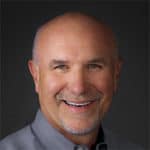
Jim Burns is the president of HomeWord. and the executive director of the HomeWord Center for Youth and Family at Azusa Pacific University. He is a popular public speaker and writer who has almost two million resources in print in 20 languages. He primarily addresses the topics of building strong marriages, encouraging parents and empowering kids and healthy leaders. Jim’s books include Confident Parenting, The Purity Code, and Creating an Intimate Marriage. He and his wife, Cathy, reside in Southern California and have three grown daughters and two grandchildren.
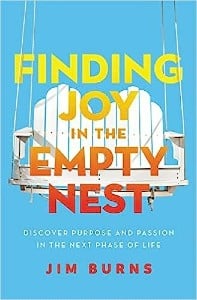
Receive the book Finding Joy in the Empty Nest and the audio download of the broadcast "Finding Purpose In Your Empty Nest Years" for your donation of any amount! Plus, receive member-exclusive benefits when you make a recurring gift today. Your monthly support helps families thrive.
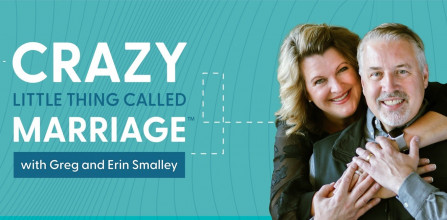
On this brand new podcast, Greg and Erin Smalley give you a seat at the table as they dig deep into what a healthy and godly marriage should look like.

Visit our online store and purchase a CD of today's program for yourself or to share with a friend.
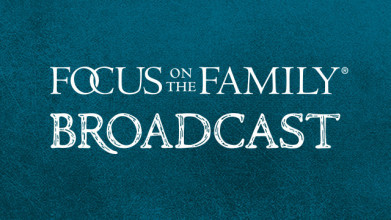
Jill Savage offers encouragement and insight to parents facing the challenges that come with reorienting their lives after their children leave home.

Many options are open to couples whose kids have moved out. Here are some tips on how to use time wisely during the empty-nest years.

When adult children reject the faith, questions arise from the emotions and doubt. Learn how to commit to loving your kids in this situation.

With every major life change, couples have to re-invent their relationship.

Just when you thought it was safe to enjoy your newly empty nest, your adult child decides to move back in. Here’s how parents and grown children can work together to make the experience a positive one.

Some couples wonder about the future of their marriage after the kids move out. But you can grow closer to your spouse and the Lord during this time.

This discussion offers a preview of Volume #16 “Cultures in Conflict” from the That The World May Know video series, available below.

Debra Fileta will help couples better understand the four seasons of healthy relationships, what to expect during each one, and how to carefully navigate them for a stronger marriage. (Part 1 of 2)
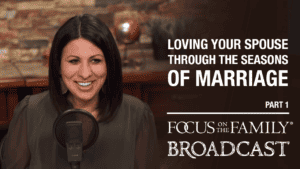
Debra Fileta will help couples better understand the four seasons of healthy relationships, what to expect during each one, and how to carefully navigate them for a stronger marriage. (Part 1 of 2)

Larnelle Harris shares stories about how God redeemed the dysfunctional past of his parents, the many African-American teachers who sacrificed their time and energy to give young men like himself a better future, and how his faithfulness to godly principles gave him greater opportunities and career success than anything else.

Amy Carroll shares how her perfectionism led to her being discontent in her marriage for over a decade, how she learned to find value in who Christ is, not in what she does, and practical ways everyone can accept the messiness of marriage and of life.

Jonathan McKee offers parents practical advice and encouragement in a discussion based on his book If I Had a Parenting Do Over: 7 Vital Changes I’d Make.